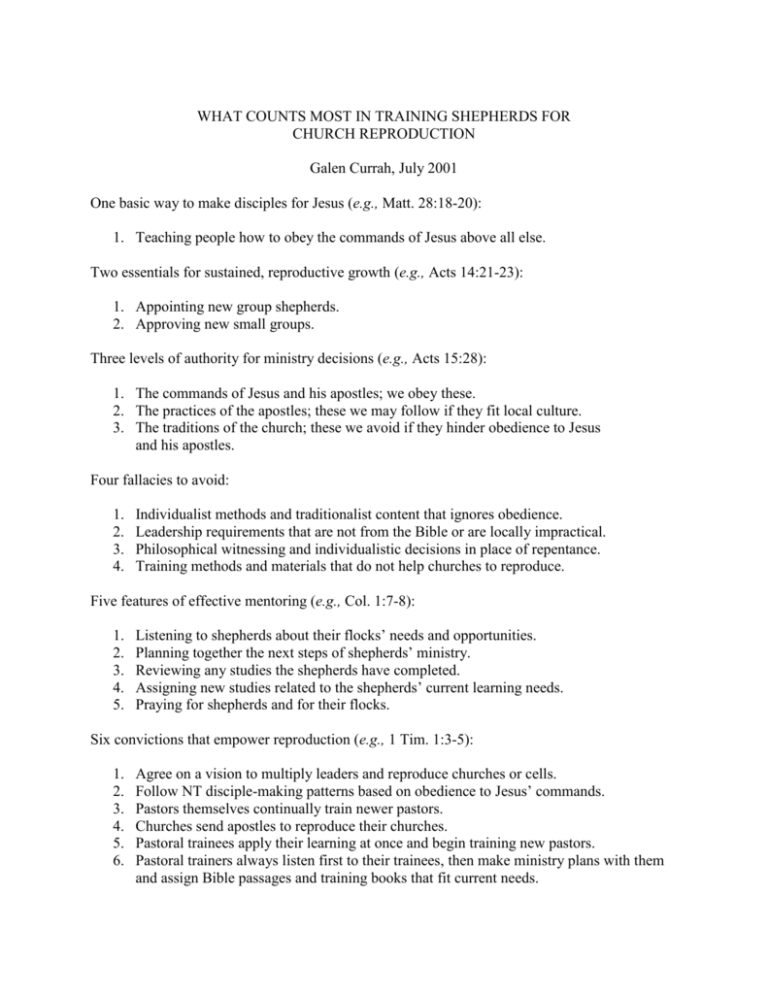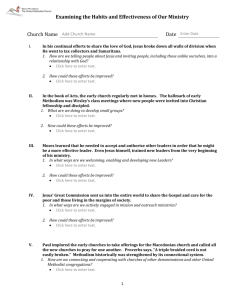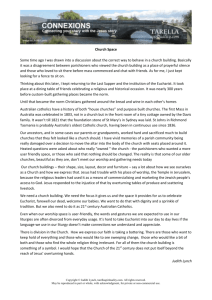What Counts Most in House Churches Reproduction
advertisement

WHAT COUNTS MOST IN TRAINING SHEPHERDS FOR CHURCH REPRODUCTION Galen Currah, July 2001 One basic way to make disciples for Jesus (e.g., Matt. 28:18-20): 1. Teaching people how to obey the commands of Jesus above all else. Two essentials for sustained, reproductive growth (e.g., Acts 14:21-23): 1. Appointing new group shepherds. 2. Approving new small groups. Three levels of authority for ministry decisions (e.g., Acts 15:28): 1. The commands of Jesus and his apostles; we obey these. 2. The practices of the apostles; these we may follow if they fit local culture. 3. The traditions of the church; these we avoid if they hinder obedience to Jesus and his apostles. Four fallacies to avoid: 1. 2. 3. 4. Individualist methods and traditionalist content that ignores obedience. Leadership requirements that are not from the Bible or are locally impractical. Philosophical witnessing and individualistic decisions in place of repentance. Training methods and materials that do not help churches to reproduce. Five features of effective mentoring (e.g., Col. 1:7-8): 1. 2. 3. 4. 5. Listening to shepherds about their flocks’ needs and opportunities. Planning together the next steps of shepherds’ ministry. Reviewing any studies the shepherds have completed. Assigning new studies related to the shepherds’ current learning needs. Praying for shepherds and for their flocks. Six convictions that empower reproduction (e.g., 1 Tim. 1:3-5): 1. 2. 3. 4. 5. 6. Agree on a vision to multiply leaders and reproduce churches or cells. Follow NT disciple-making patterns based on obedience to Jesus’ commands. Pastors themselves continually train newer pastors. Churches send apostles to reproduce their churches. Pastoral trainees apply their learning at once and begin training new pastors. Pastoral trainers always listen first to their trainees, then make ministry plans with them and assign Bible passages and training books that fit current needs. Seven tasks for edifying, reproductive small groups (e.g., Eph. 4:15-16): 1. Agree on what they are and do as a group. 2. Build all ministries on obedience to Jesus Christ. 3. Constantly train new leaders for new groups. 4. Develop all essential New Testament ministries. 5. Harvest the souls the Lord brings them in contact with. 6. Help each person to know and use their gifts. 7. Serve one another within the family of God. Eight elements of Christian worship for groups of all sizes (e.g., 1 Cor. 14:26). 1. Bible applications. 2. Confession and forgiveness. 3. Fellowship and sharing. 4. Formal starting and stopping times (where the culture requires it). 5. Giving to meet needs. 6. Praise. 7. Prayer. 8. The Lord’s supper. Nine necessities of reproductive churches (Neumann, e.g., Acts 2:43-47): 1. Continual use of effective means of drawing people to faith in Jesus. 2. Flexible structures that enable them to implement their vision. 3. Frequent prayer to make people and ministries fruitful. 4. Helping people to apply God’s Word in their everyday lives. 5. Little or no concern for buildings or budgets. 6. Lots of caring one for another in practical ways. 7. Programs for constantly training new leaders and forming new groups. 8. Vision for serving their city or nation. 9. Worship that involves people in honoring God. Ten essential ministries of NT churches (*Train & Multiply, e.g., 1 Tim. 6:6-11): 1. Correcting, disciplining and restoring those who err or who sin. 2. Disciple-making for all ages and backgrounds. 3. Matching peoples’ spiritual gifts with service opportunities. 4. Pastoral care and counsel for persons and families. 5. Personal, family and corporate worship. 6. Prayers and intercessions for all kinds of people. 7. Recognizing, sending and supporting evangelists and missionaries. 8. Stewardship of wealth, time and talents to provide for needs. 9. Teaching, defending and applying the Word of God. 10. Training, testing and appointing of new shepherds and elders. * A program of mentored leader training for reproductive growth. www.TrainAndMultiply.com











